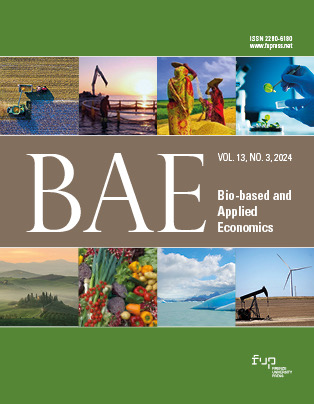Exploring preferences for contractual terms in a scenario of ecological transition for the agri-food sector: a latent class approach
Published 2024-05-23
Keywords
- contracts,
- transition,
- NIE,
- latent class analysis,
- cereals
How to Cite
Copyright (c) 2023 Stefano CIliberti, Angelo Frascarelli, Andrea Marchini, Gaetano Martino

This work is licensed under a Creative Commons Attribution 4.0 International License.
Funding data
Abstract
Governance mechanisms along the agri-food supply chains are increasingly important in a scenario of ecological transition. Under the conceptual and analytical lens of the Transaction Cost Economics, we explored farmers’ preferences towards a variety of clauses usually adopted in production contracts. To this purpose, a discrete choice experiment among 190 durum wheat producers in Italy was conducted. Results from a latent class model showed that producers were mainly interested in fixed prices formula and to join shared rules of production but revealed little or no interest for compelling sustainable cultivation techniques and the provision of technical assistance. However, these preferences are heterogeneous across farmers and vary depending on their level of education and previous use of contractual arrangements, with relevant implications for contract design and management.
Governance mechanisms along the agri-food supply chains are increasingly important in a scenario of ecological transition. Under the conceptual and analytical lens of the Neo Institutional Economics, we explored farmers’ preferences towards a variety of clauses usually adopted in production contracts. To this purpose, a discrete choice experiment among 190 durum wheat producers in Italy was conducted. Results from a latent class model showed that that producers were mainly interested in fixed prices formula and to join shared rules of production but revealed little or no interest for compelling sustainable cultivation techniques and the provision of technical assistance. However, these preferences are heterogenous across farmers and vary depending on their level of education and previous use of contractual arrangements, with relevant implications for contract design and management.






